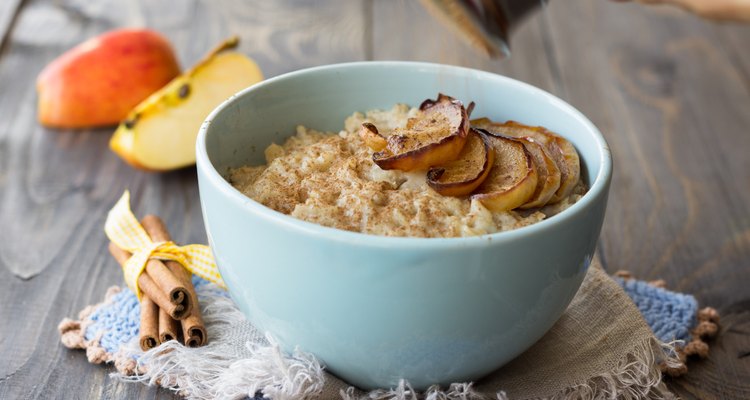
OlgaLepeshkina/iStock/Getty Images
For those with allergies, knowing if oatmeal contains yeast is an important question. Oatmeal is a nutritious whole grain made by grounding whole oats. Yeast is a tiny, sugar-eating fungus that can be used to make breads rise or help in the fermentation of alcohol. Oatmeal does not contain yeast; however, some products made with oatmeal may have yeast in them. The key is to read the nutrition label to determine if the product you are eating contains yeast.
Oatmeal Nutritional Facts
A 1/2-cup serving of oatmeal is approximately 117 g by weight. Plain oatmeal, cooked in water, contains just 80 calories per serving. The United States Department of Agriculture recommends that your fiber intake be at least 25 to 30 g per day. One serving of oatmeal contains 2 g or about 8 percent of your daily recommended value. Oatmeal also contains 6 percent of your recommended daily value for iron and 2 percent of your DV for calcium.
Cooking Oatmeal
Plain oatmeal is easy to cook and takes just a small amount of time. This makes oatmeal a healthy, quick choice for breakfast. Put 1/2 to 3/4 cup of water in a small saucepan. Cook on a stovetop until water begins to boil. Place 1/2 cup of oats into the water, and cook for 5 minutes. Remove from the stove and let sit for three to five minutes before serving. You can also substitute the water for milk for heartier, thicker oatmeal.
Oatmeal and Yeast Products
One of the primary concerns with those who have yeast allergies is avoiding products that contain yeast but still enjoying the health benefits of oatmeal. oat bread and oat muffins are likely to contain both oats and yeast. The yeast allows the bread and muffins to rise. Unleavened bread, or yeast-less bread, that contains oats may be safe to eat for those with yeast allergies; however, check the label to be sure. Breakfast cereal bars are another highly likely place to see the combination of oatmeal and yeast.
Health Benefits
Oatmeal is often touted for its many health benefits. The MayoClinic.com notes that the soluble fiber in oatmeal has been shown to reduce your bad cholesterol numbers because it helps to absorb and remove cholesterol in your bloodstream. Oatmeal can also be effective in the treatment of constipation. The fiber found in oatmeal can help build “bulk” to your stool and this increased bulk can help clean out your digestive system and cause your bowels to release stool more easily.
Considerations
Although oats are healthy, it is vital to determine if a product contains yeast if you have a yeast allergy. Always consult your doctor and nutritionist if you are unsure the product you are eating contains both oats and yeast. Oatmeal does show promise in treatment of high cholesterol and constipation, but you should consult your doctor to see if inclusion oatmeal in your diet is appropriate for your specific needs.
Related Articles
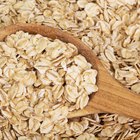
Can You Use Oatmeal to Remove ...
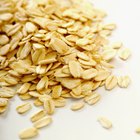
Can You Substitute Quick Cook Oats for ...
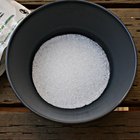
How to Make Xylitol Toothpaste
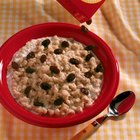
How Many Calories Do Oats Contain?

Can I Substitute Rolled Oats for Flour ...

How to Make Quaker Oatmeal
Old Fashioned Oats in Place of ...

How to Cook Oat Groats in a Crock Pot
Role of Xanthan Gum in Vegan Baking

How to Cook Oat Groats in a Slow Cooker

Acne & Brewer's Yeast

How to Microwave Steel Cut Oats
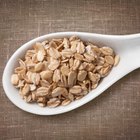
Does Instant Oatmeal Have Less Fiber ...

How to Make Dough in a KitchenAid Mixer

Can You Substitute Butter for ...

How to Use Oat Flour in a Pie Crust
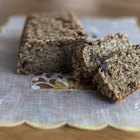
Gluten-Free Bread Without Eggs

Does Benefiber Lower Cholesterol?

Purpose of Rolled Oats in Baking

Can I Use Oatmeal for Rolled Oats in ...
References
Writer Bio
Joshua Bailey has been writing articles since 2006 with work appearing at Bodybuilding.com and 2athletes.com. Bailey holds the following certifications: NASM-CPT, NASM-PES, NASM-CES and NSCA-CSCS. He also holds a Bachelor of Science in exercise and sports science from the University of North Carolina, Chapel Hill and a Master of Science in exercise physiology from the University of North Carolina, Greensboro.
Photo Credits
OlgaLepeshkina/iStock/Getty Images